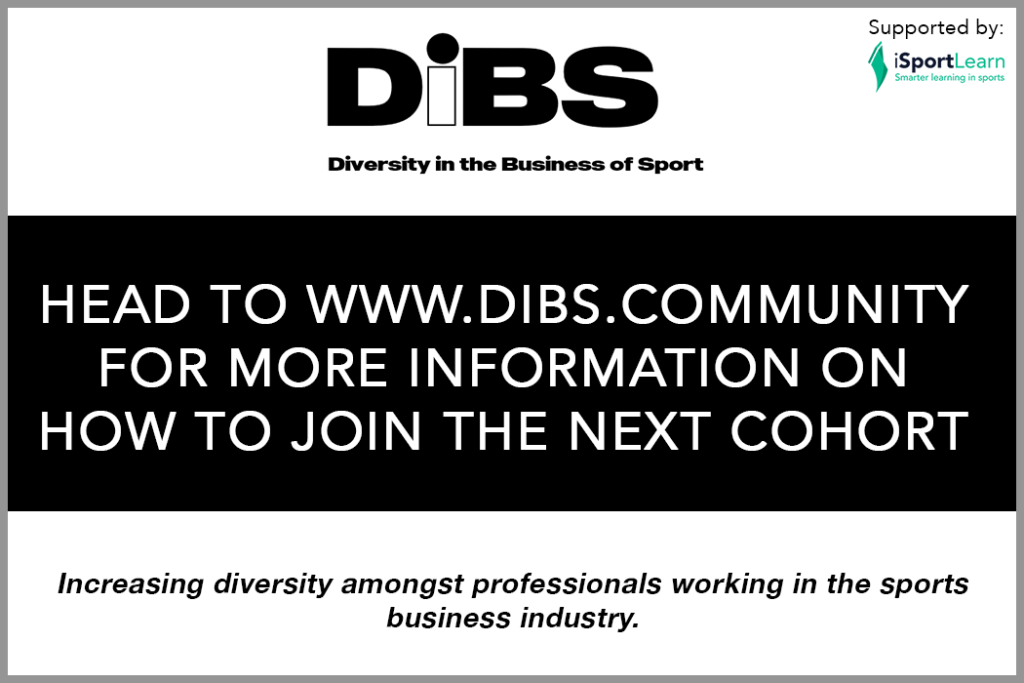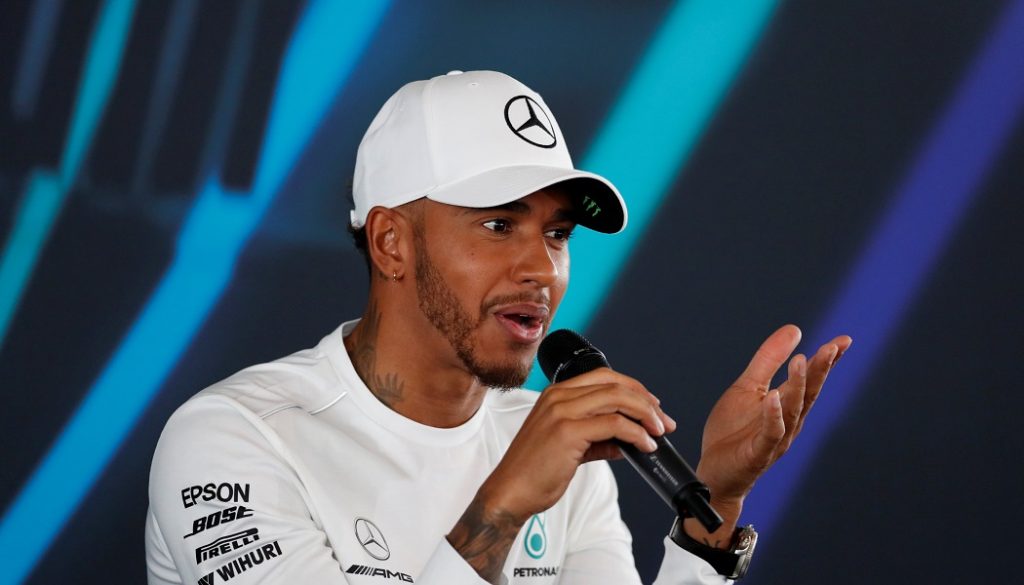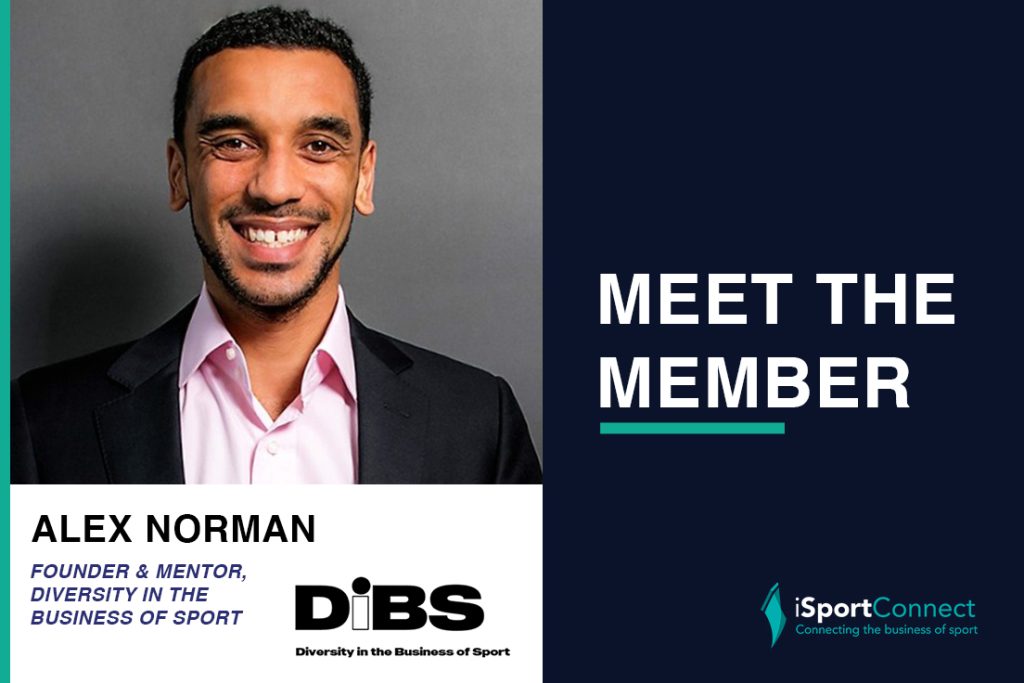“I Genuinely Believe Most People Who Work In Sports Business Are In Favour Of Diversity”
December 8, 2021
iSportConnect speaks with Alex Norman, Founder & Mentor at Diversity in the Business of Sport. Alex discusses how his scheme helps junior executives from BAME communities who are looking to develop their skills in the sports industry, whether there’s now a greater awareness of working in sports business for those from different communities and changing the messaging around diversity.
Tell us a bit about your background Alex and why you started DiBS?
I’ve been a qualified lawyer for ten years and quite early in my career I decided to pivot towards just working with sport and media clients, which meant leaving a big corporate firm and going to a much smaller, more specialist, firm in London. Having cut my teeth in sport there I was given the opportunity to move to Hong Kong and lead Bird & Bird’s sports media practice in Asia. The move was slightly easier as I had spent time in Hong Kong as a trainee lawyer and was familiar with the region. It has been nearly six years since I moved out and, having started from a small base, I have built a terrific set of clients and a good pipeline of business and work with some of the premier rights holders, broadcasters, agencies and stakeholders in sport across the region.
I’ve been working in sport for around eight years and have developed a great network and friends from lots of different places. Some of them are from diverse backgrounds, but many aren’t. One of the things that struck me in the industry is just how lacking in diversity it is.
“I felt that one of the easiest and most tangible ways to make a difference was to start a mentoring scheme for juniors from diverse backgrounds.”
There was an idea that had been churning around in my head for a while about what we could do positively to make a difference in terms of the demographics of people who work in the sports business.
I talked to a number of like-minded friends and contacts and created DiBS – Diversity in the Business of Sport. The aim of DiBS is simple – to increase the diversity of people working in the sports business.
We’re a not-for-profit and don’t have external funding, so our ambition had to match the reality of what we could achieve. I felt that one of the easiest and most tangible ways to make a difference was to start a mentoring scheme for juniors from diverse backgrounds. Our aim is to use the expertise and time of our mentoring group to turbocharge the career or our mentees. All the mentors are from black, Asian or ethnic minority (BAME) backgrounds and so are our mentees.
What’s the overriding goal of DiBS?
The scheme is intended to enhance the professional skills of the people in the programme but also to give them a ready-made network that will continue to expand as we run more and more cohorts. We’re about to finish off our first six month long cohort. We will run another one of these early next year for another six months. Our network is around 20 people currently, which is great, and this time next year it will be bigger and it’ll continue to grow from there. That might seem small, but it’s incredibly powerful when you consider the people involved.
“I think most people in our mentor group would agree with me when I say that I genuinely believe most people who work in sports business are in favour of diversity, one way or another.”
It’s really pleasing that we’ve come through the first six months because, when you’re looking at people doing it outside of work in their own time, there is no guarantee of success. I’m really happy we’ve managed to create and carry momentum. Both mentors and mentees are engaged with it and we’re looking to understand how we make the programme better and enhance it for the next time we run it.
It’s a relatively small group of people trying to make a difference at a really individual level to people’s careers. Our belief is that it is something which will pay dividends in the future, it might not be the only thing that we do in the future, but that’s certainly our starting point.
You say you wanted to make something where there was a tangible benefit. In terms of the current group of mentors, was mentorship something you believed people needed or did it come from having experienced it in your own careers?
A few but not all of the mentors have been on mentoring programmes either as a mentor or mentee before, so we do understand the value of it. I think the reason we settled on mentoring is we saw it as the best way to make a tangible difference with the time and resources we had.
There were other things we could have done, absolutely. We could have biased more towards advocacy, networking or recruitment maybe, but we felt that the people and the talent we had are best expended in a mentoring type environment.

Apply via the DiBS website at this link – https://www.dibs.community/mentoring
The other point to make is that the problem we’re trying to address is not structural discrimination. I think most people in our mentor group would agree with me when I say that I genuinely believe most people who work in sports business are in favour of diversity, one way or another. The fact of the matter is it just hasn’t happened, that’s partly due to the structure of sports business, it’s small and based on networks and, therefore, it tends to be biased towards people who know people in the industry.
While the issue isn’t structural, the problem we’re trying to address is there just aren’t enough candidates out there who are aware that sports business is an option, and then when there are, they may not have had that benefit of when looking further up the chain seeing people who look like them. The mentoring scheme is designed to address that. As one of our mentees put it “If you can see it, you can be it”.
When looking at the current cohort and the programme, where are all of the mentees based?
We’re completely global, our mentors and mentees are from all over. We have a high concentration of mentors in Europe, some in London and Switzerland, we’ve got a couple in Singapore and one in Hong Kong. It’s fair to say that both mentors and mentees come from a global environment, with a slight bias towards Europe and Asia. We don’t currently have coverage in terms of the US or South America but we will look at that in future.
While it’s great to be truly global, the downside is that it makes it more difficult for people to meet in real life. That said, I think overall the benefits of being global outweigh the negatives.
In terms of these young people getting involved in this, do they go through an application system on the site or get in touch with any of the mentors?
For people who want to apply we have a rolling application process where there’s no deadlines. We’ll look at them all as a whole when we’re ready to recruit for our next cohort, so if you go to our website which is www.dibs.community, you will see that all you have to do is send us a simple CV and a short statement to apply.
“When I was starting my career I didn’t know sports business was an option. I assumed it was a very niche industry with very few roles.”
It’s really easy to do, we don’t bias around deadlines and that kind of thing because our aim is to help as many people as possible, so the more people that apply the better and we want to make it as easy as possible. Our application process is entirely meritocratic, it’s not based on who you know, and anyone has a shot of getting a place when they apply through our website.
As the business of sport is becoming more mature and expanding much further, do you think there’s now a much greater awareness of the business side by young people from diverse backgrounds that did not exist before?
It’s a good question, because when I was starting my career I didn’t know sports business was an option. I assumed it was a very niche industry with very few roles. The reality when I got into it was there are so many roles, whether you’re a lawyer, an accountant, a business development professional or someone who likes TV production or sales and more.
My assumption is that it is more accessible than it once was, as you say because it’s grown, but there’s always room to do better and the point is that people should know it’s an option and understand their options so they can make informed decisions. That’s where I’d like to get to because I think, to be honest with you, for many people, myself included, it was very difficult to conceptualise what the industry was and what you could do until you actually had spent a number of years working there. We’re trying to break down a few of those barriers. That’s certainly part of what we do, try and give people, mentees or anyone else who speaks to us information about what pathways are there so you can make that informed choice.
We’ve established that the leadership of sports business is a very white, male-dominated area. Do you think kids from the BAME community who might want to get into the industry are put off because they don’t see people they feel they can relate to?
I don’t know if it’s necessarily off-putting. What I would say to frame it more positively is that you’re always more likely to want to do something, or be incentivised to do something, if you see someone who you can identify with and see as a genuine role model. So I think there’s plenty of people out there who work in sport who are fantastic role models, regardless of their ethnicity or background.

But certainly in terms of what we’re saying, that sport is currently unrepresentative of minority groups, if you have role models it is a way to encourage people to do those things as they open people’s eyes. I’m sure for many black kids in America, when Barack Obama became president their horizons and outlook would have changed fairly significantly in a very short period of time just by virtue of seeing someone who looks more like them.
This is something you are aiding with your scheme, but how important is continued education in people’s career progression?
It’s no secret that most people’s parents want kids to stay in school and do well at school because education is the tool you can use to improve yourself. A personal view I guess is that there’s a real value in continuing education one way or another, whether it’s through something like an iSportLearn platform or something more formal. Because knowing more about any industry is always going to serve you well and that’s certainly part of what we try to do by enhancing people’s knowledge as well as their skills.
It goes back a bit to what I said earlier, people are most successful when they understand all the options available and can choose those options which are most likely to give them a chance of success.
We’ve seen how major athletes are now using their platforms to try and create change, how important is that in terms of changing the messaging around these issues?
We come at it from a very business angle and behind the scenes, so most of the people who are mentors or mentees are never going to be front and centre of external facing campaigns. But when you see someone like Marcus Rashford, Raheem Sterling, Lewis Hamilton making points about diversity and equality it helps fuel that narrative in a number of different ways.
“What you see from those athletes with a huge public profile absolutely helps us and in some ways we’ve come at a good time for that. Some of the desire for us to do this is fuelled by that desire for broader societal change.”
Take someone like Lewis Hamilton, who does a lot of social justice type campaigning, which is really important and something very different to what we do. At the same time he has something called the Hamilton Commission, which is intended to increase the number of people from diverse backgrounds in Formula One and motorsport.
What you see from those athletes with a huge public profile absolutely helps us and in some ways we’ve come at a good time for that. Some of the desire for us to do this is fuelled by that desire for broader societal change.
As you have been in and around the industry for a little while now, would you say that while visible changes have maybe been lacking, attitudes have been changing when it comes to the business of sport?
The public mood around it certainly has changed, which has allowed schemes like ours to be successful, and has meant that companies like yourselves and others are keen to engage them because they understand the value. From a longer term perspective I don’t know if there’s a bigger cultural shift taking place, but what I do know is that it’s something that people think is important. I’m glad they do and we’re hoping to contribute to turning that goodwill into tangible action.



